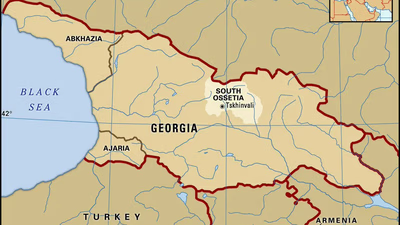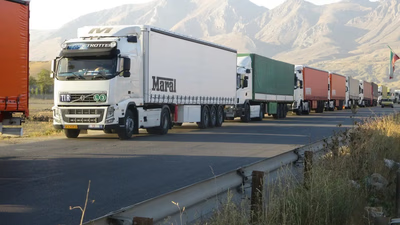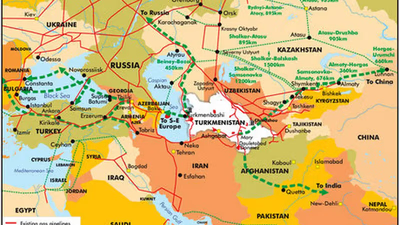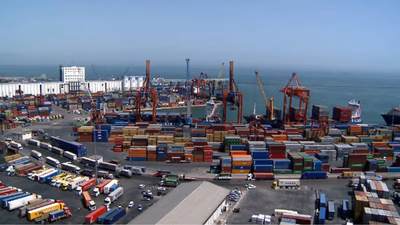
Georgia"s agriculture and tourism sectors offer vast trade potential. "
Georgia's rich cultural heritage, stunning landscapes, and historical sites attract a growing number of tourists each year. The tourism sector has witnessed significant development, particularly in regions like Tbilisi, Batumi, and the wine-producing areas of Kakheti. Opportunities exist for hotel and resort development, tour operators, restaurants, and other related services catering to both domestic and international tourists. Agriculture plays a vital role in Georgia's economy, and the country is known for its high-quality agricultural products, including wine, fruits, vegetables, nuts, and tea. There are opportunities for investment in modernizing farming techniques, improving infrastructure, and expanding food processing facilities. Exporting agricultural products to international markets is also a potential avenue for business growth.
Georgia's strategic location, preferential trade agreements, and low-cost labor make it an attractive destination for manufacturing and export-oriented businesses. Industries such as textiles, apparel, automotive components, electronics, and chemicals have shown potential for growth. The development of free industrial zones and simplified administrative procedures further facilitate investment in the manufacturing sector. The construction and real estate sectors have experienced significant growth in recent years, driven by urban development, infrastructure projects, and increasing demand for residential and commercial properties. Opportunities exist for real estate development, construction companies, architecture and design services, and property management. The best business in Georgia is very unprofessional, regardless of the working capital.
The most important business sectors in Georgia are:
- Industrial
- Agriculture
- Tourism
- Construction
Currently, most Iranians living in Georgia work in the real estate industry
- Some are building property
- Some are buying and selling
- A number as a real estate consultant
They work, but the construction industry is only a small part of the business opportunities in Georgia.
- Export of goods from Iran to Georgia
- Agriculture, especially the packaging of agricultural products
- Cafes and restaurants in Tbilisi and Batumi
- Aviculture
Georgia's economic system is a free economic system. In Georgia, the cost of advertising for an individual may exceed many of the costs of exporting or importing and producing goods. In a free economy, owning any goods is not a privilege. Therefore, it is produced if it has a good consumer. It should be noted that in Georgia, the highest cost is spent on advertising goods for sale, and sometimes the cost of advertising may be more than the cost of producing goods. Imports from Georgia to Iran have been slightly higher in recent years. Recent international sanctions have made it difficult for imports and exports to enter the country.
Imports from Georgia to Iran are limited to certain products, one of the most important of which is the import of meat from Georgia. Iran imports about $ 40 million worth of goods from Georgia. These goods include Georgian wood, especially beech wood, ferro-manganese, freshly dried walnuts, tractors and machines, metal turning and ironwork for construction work. Imports from Georgia to Iran can be pursued on a larger scale and include a variety of goods. This country, like Iran, has more potential for exporting its goods, but because both countries do not create favorable conditions for economic exchanges in this field and the economic delegations of both countries are not fully aware of each other's investments, these cases do not seriously pursued.
In recent years, agreements have been reached between Tehran and Tbilisi to eliminate taxes and encourage investment in air, land and sea transport. Iran is working to diversify transit routes to transport its cargo to this country and import from this country to Iran, and considers this country a suitable alternative route for transporting cargo to Europe.
Georgia has significant potential in the energy sector, particularly in hydroelectric power generation. The country's mountainous terrain and numerous rivers offer favorable conditions for the development of hydroelectric plants. Additionally, there are opportunities for investment in renewable energy sources like solar and wind power. The government has implemented supportive policies to attract investment in the energy sector. Georgia has been actively working to establish itself as a regional hub for technology and innovation. The IT sector has been growing rapidly, driven by a skilled workforce and supportive government policies. Opportunities exist in software development, cybersecurity, e-commerce, digital marketing, and other IT-related services. The establishment of technology parks and startup incubators has further fostered the growth of the sector.
-

Georgia"s strategic location at the crossroads of Europe and Asia positions it as a vital trade hub, facilitating access to large markets in the Middle East and Central Asia. The country has established preferential trade agreements, including a Free Trade Agreement with the EU, enhancing its attractiveness for businesses. Georgia"s membership in the WTO further supports its trade relations. The government has implemented reforms to create a business-friendly environment, reducing bureaucracy and improving transparency, which has led to increased foreign investment. The proximity to emerging markets offers opportunities for companies looking to expand their customer base. Recent developments, such as the easing of trade barriers between Iran and Georgia following international agreements, have opened new avenues for import-export activities. Despite challenges faced by Iranian traders in the past, including financial transaction issues, recent changes have simplified customs procedures and reduced tariffs. This has made it easier for businesses to engage in cross-border trade.
Georgia"s ongoing investments in transportation infrastructure, including modernized ports and highways, are expected to enhance logistics capabilities further. Overall, Georgia presents significant opportunities for B2B marketplace activities and commodity trade within the region. "
-

Georgia"s strategic location at the crossroads of Europe and Asia significantly influences its population dynamics and economic activities. The country"s diverse geography, characterized by mountains, valleys, and coastal areas, affects settlement patterns and infrastructure development. With a total land area of approximately 69,700 square kilometers and a population of around 3. 7 million, Georgia exhibits low population density overall, with about 45% residing in the capital city, Tbilisi. This urban concentration leads to higher population density in the capital compared to rural areas. Tbilisi"s historical significance as part of the Silk Road enhances its role in trade and cultural exchange. The geographical features also impact access to resources and transportation networks, shaping migration patterns and socio-economic development. As Georgia seeks recognition from the European Union, its geopolitical position continues to facilitate trade routes and cultural interactions with neighboring countries such as Turkey, Armenia, Azerbaijan, and Russia.
Understanding these dynamics is crucial for businesses looking to engage in trade within the region. "
-

Georgia"s linguistic landscape is dominated by the Georgian language, which is integral to its national identity and governance. The country also hosts a variety of languages, including Russian and Armenian, reflecting its cultural diversity. Eastern Orthodox Christianity is the predominant religion, influencing social dynamics and political discourse. Georgia"s economy has evolved since its independence in 1991, focusing on market-oriented reforms that attract foreign investment in sectors like agriculture and tourism. Despite these advancements, challenges such as high unemployment (13. 6%) and poverty (31%) persist. The political framework is a parliamentary republic with a multi-party system, where economic policies are shaped by political developments. Georgia"s trade includes imports of fuel and machinery from countries like Russia and Turkey, while exports feature products such as mineral water and fruits to various international markets. Understanding these dynamics is crucial for businesses looking to engage in the region"s trade opportunities.
-

Georgia has streamlined its customs procedures to enhance trade efficiency, reducing bureaucratic hurdles for importers and exporters. Customs declarations are mandatory, detailing the nature and value of goods. The country adheres to WTO customs valuation principles for determining the customs value, which is essential for calculating duties and taxes. Certain goods may be exempt from export duties, while others, particularly natural resources and specific agricultural products, may incur restrictions or tariffs. Import duties vary by product category; for instance, cosmetics and certain food items have a 5% duty, while others like honey and dairy products face a 12% duty. Documentation such as commercial invoices and packing lists is required for customs clearance. Georgia"s tariff structure is relatively low, with ongoing reductions to attract foreign investment. The country has established preferential trade agreements that offer reduced or zero tariffs on specific goods traded with EU member states.
For detailed information on customs laws and export tariffs, businesses can consult the Revenue Service of Georgia or the Ministry of Economy and Sustainable Development. "
-

Georgia"s economy heavily relies on imports, particularly energy resources like natural gas and oil products, alongside machinery and industrial goods essential for various sectors including agriculture and construction. The country also imports consumer goods such as electronics, clothing, and food products to meet domestic demand. Notably, the automotive sector sees significant imports of vehicles and parts. Georgia"s exports include agricultural products like wine and nuts, as well as minerals such as copper and gold. Despite challenges in trade relations with Iran, there is potential for increased exports from Iran to Georgia. The establishment of a company in Georgia"s free trade zones can streamline import-export processes. Economic reforms over the past decade have bolstered Georgia"s trade attractiveness, with foreign trade reaching $826. 8 million in January 2019 alone.
Key trading partners include the EU, Turkey, Russia, and neighboring Caucasus countries. The Deep and Comprehensive Free Trade Agreement (DCFTA) with the EU has enhanced market access for Georgian goods.
-

Georgia presents diverse trade opportunities across various sectors, including agriculture, tourism, manufacturing, and energy. The agricultural sector is notable for its high-quality products like wine and nuts, with potential for modernization and export growth. The tourism industry is thriving, particularly in Tbilisi and Batumi, creating demand for hospitality services. Manufacturing benefits from Georgia"s strategic location and low labor costs, with industries such as textiles and automotive components showing promise. The construction sector is also expanding due to urban development needs. Despite challenges in advertising costs exceeding production expenses, the free economic system encourages business ventures. Trade relations with Iran are evolving, focusing on goods like meat and wood products. Additionally, Georgia"s energy sector offers investment opportunities in hydroelectric power and renewables. The IT industry is rapidly growing, supported by government initiatives aimed at fostering innovation through technology parks and incubators.
-

Imports from Georgia to Iran are primarily focused on specific products, notably meat, beech wood, ferro-manganese, and machinery. The total value of imports from Georgia to Iran is approximately $40 million. Despite the potential for increased trade, economic exchanges are hindered by a lack of awareness among economic delegations regarding investment opportunities. Recent agreements between Tehran and Tbilisi aim to eliminate taxes and enhance transport investments. Iran views Georgia as a strategic alternative route for cargo transport to Europe. Current imports include various goods such as tractors, metalworking machines, and cars, with the latter being attractive due to lower prices in Georgia compared to Iran. However, importing cars requires compliance with legal procedures. Goods imported from Georgia fall into three categories: authorized goods that do not require licenses, conditional goods needing licenses (like wheat), and prohibited goods under Islamic law (such as alcohol).
The importation of live cattle has also gained traction due to local production in Georgia. Quality assurance is crucial when importing industrial goods; thus, it is recommended to source products from reputable manufacturers. Additionally, Georgia"s political stability enhances its appeal for traders engaged in import-export activities. "







